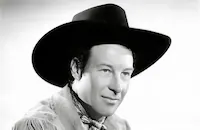The Forty-Niners

Brief Synopsis
Cast & Crew
Thomas Carr
Wild Bill Elliott
Virginia Grey
Henry Morgan
John Doucette
Lane Bradford
Film Details
Technical Specs

Synopsis
During the California gold rush of 1849, the law is enforced by the few United States marshals the federal government can spare. After a marshal is killed by two gunmen while investigating a mining claim boundary dispute, a man named Everett is charged with the crime. Everett confesses that he hired the gunmen, whose names he does not know, through cardsharp Alf Billings. Marshal Sam Nelson is then assigned to capture Billings and the gunmen. Working undercover as a gunman, Sam visits several mining towns and eventually finds Billings in a poker game during which he is accused of cheating. After Sam comes to his defense, Billings gratefully suggests that they team up. As Sam needs Billings to give him the killers' names, he agrees and they move on to the town of Cold Water where, in a saloon, Billings spots owner Ernie Walker and sheriff William Norris, the two gunmen he had supplied to Everett. Later, after explaining to Walker and Norris that he has written a letter detailing their careers as killers, Billings tells them that, if anything happens to him, the letter's contents will be divulged. He then demands half of everything they control in Cold Water, and Walker and Norris have no choice but to agree to Billings' terms. Billings tells Sam about his new partnership and suggests that they could become sole owners if Walker and Norris were eliminated. Later, after Walker and Norris search for the letter but are unable to find it, they plan to use Stella, Walker's wife and an old friend of Billings, to acquire it. Stella, who is unhappy with Walker, learns from Billings that he had intended to marry her and now wants her to leave with him after matters are resolved. When Billings offers Sam a large sum of money to kill Walker and Norris, Sam realises that they are the men he is looking for. Needing proof, Sam sends a message, via Wells Fargo, to headquarters requesting that Everett be sent out, under guard, to identify positively Walker and Norris. When Norris intercepts the message, he, Walker and Billings discover Sam's true identity and mission and decide that Billings should kill Sam. Billings is unable to go through with it and tells Sam that Walker and Norris are the killers he supplied to Everett. Billings then offers to help Sam catch them as he is tired of the life he is leading and wants to settle down with Stella. He also asks Sam to testify on his behalf at any trial. Although Sam does not totally trust Billings, they devise a plan to ambush the killers: Billings will tell Walker and Norris that he has killed Sam and bring them to see the body, whereupon Sam will arrest them. However, the plan backfires when Norris becomes suspicious and shoots Billings who, although wounded, rides off. Sam hears the shots, comes to investigate, and in a gunfight with Norris, kills him. Billings rides to Stella's house where he writes a letter to the hotel clerk asking him to take the letter from the safe and give it to Stella. Meanwhile, Sam follows Billings' trail and finds him. Shortly after telling Sam that he wants him to have the letter, Billings dies. Walker arrives and tries to get the letter but is captured by Sam. Walker is soon convicted and hanged.

Director
Thomas Carr
Cast

Wild Bill Elliott

Virginia Grey

Henry Morgan

John Doucette
Lane Bradford
Stanford Jolley
Harry Lauter
Earle Hodgins
Dean Cromer
Ralph Sanford

Gregg Barton
Crew
Mary Chaffee
Charles Cooper
Vincent M. Fennelly
Sam Fields
Raoul Kraushaar
Ray Mercer
Ernest Miller
Stanley Price
Melville Shyer
Vincent A. Taylor
Dan Ullman
James West

Film Details
Technical Specs

Articles
The Forty-Niners
By Richard Harland Smith

The Forty-Niners
Quotes
Trivia
Notes
A narration, spoken by Wild Bill Elliott as his character, "Sam Nelson," is provided intermittently throughout the film. Some reviews commented that the narration was similar in style to Dragnet. A studio production sheet of December 15, 1953, lists Melville Shyer as production manager and Fred Collings as assistant director, although Shyer is listed as the assistant director in the onscreen credits. A modern source adds Stanley Price and Jack O'Shea to the cast.














